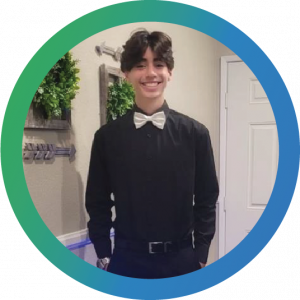National Teach Children to Save Money Day is a wonderful opportunity to instill the value of saving money in young minds. In honor of National Teach Children to Save Day, team members at FinWise Bank were asked how they taught children the importance of saving and what methods they used to teach children to save. Five FinWise team members share their expertise and advice to parents and people who influence children’s saving habits.
Visualizing Savings

Candice Antinori
Candice started a bank account for her son Kenny when he was a baby. By showing him the balance, she sparked his interest in saving.
“He realized by the time he was 5 years old, that if he wants something expensive, he needs to work to earn it, and if he saves his money he earns, one day he can afford it.”
– Candice Antinori
Kenny saves every dollar he makes in his piggy🐖 bank, even those he sneakily takes from his Daddy’s wallet.
Start Small and then Save For a Bigger Dream

Catherine Thompson
Catherine suggests starting small by giving kids goals to work towards, like saving for a toy or game.
“Once they understand the importance of saving, and the rewards that can come from it, let them earn the reward by buying what they were saving for, then start over with a bigger goal. As they get older, the goal gets bigger.”
– Catherine Thompson
Catherine’s children started saving for horses at a young age, covering a small percentage of the costs initially and increasing their responsibility over time. By the time they were 18, they were fully responsible for all horse-related expenses 🐎.
Reserve Rewards for Special Occasions and Achievements

Nancy Caputa
Nancy’s children have a 529 Plan and a savings account, with contributions from grandparents and parents. They also receive funds for holidays and birthdays, which are added to their savings accounts. Nancy lets her kids know when funds have been added to their accounts so if and when they really want something, they will have the means to pay for it.
“Given that the kids are younger, the concept of money is still very new to them. I think it also helps that when the kids are with us at Target, or any type of consumer store where the kids are always very happy to ask for a toy, we let them know that those are for special occasions.
However, if they continue to listen, work on goals (such as potty training or learning their numbers), there are concessions, and they will be able to pick something (small) out for achieving those goals.”
– Nancy Caputa
Nancy also mentors her niece and nephew. Nancy, alongside her siblings give her niece and nephew a budget and the kids decide on what they want to purchase. The kids typically set their own budget so they can keep a little bit of leftover cash💰.
Teach Regular Savings Habits and Use Visual Aids (Like Pickle Jars)

Judy Morgan
For our kids we got them all huge pickle jars and started them off with some money in them. We told them to put in their left over change at the end of each day and they will be surprised how much is in the jar at the end of a year.
– Judy Morgan
For her grandkids, she opened savings accounts and contributes money instead of giving presents. Judy and her husband have stressed the importance of having money backed up in case of emergencies.
She also encourages her kids to save 10% of their earnings 💵.
Becoming Your Own Bank with Financial Freedom Friday

Andrew
Desiree believes teaching kids about money management, saving, and investing empowers them to make informed decisions, establish independence, and achieve their goals.
Desiree helped her sixteen-year-old nephew, who started a mobile detailing business, loves math and basketball and aspires to join the Duke University basketball team to become financially savvy. As a family of faith-driven entrepreneurs, they want to help him learn in a low-risk environment with the support of family around him.
Andrew agreed to meet Desiree virtually on a weekly basis for what she named “Financial Freedom Friday.”
During their meetings, they discussed:
-
- Earnings: How much he earned in his business in the last week
- Gratitude: The amount he gave back to God.
- Reinvestment: Funds set aside for business equipment purchases like a mobile water tank.
- Savings: Money put into his savings account.
- Investments: Cash allocated to invest in Crypto
Prioritization and Celebration: Desiree and her nephew prioritized the list and created agreed-upon percentages for each item since entrepreneurial income fluctuates. Celebrating wins is crucial, Desiree’s favorite way is a 60-second dance party on her mini-trampoline!
Learning and Mentoring: Desiree and her nephew reviewed his custodial freedom fund balances together. He explained his investment decisions based on what he learned from a trading simulator called CryptoParrot. After mentoring, Desiree screen-shared the process of managing his custodial accounts, which he would take over at 18.
Milestone Goals: If he reached his first milestone goal of building $1,000 in his Crypto Freedom Fund, Desiree would match it! The best goal? He becomes his own bank to finance whatever he needs when he gets to Duke University to focus on his studies and making it to the NBA🏀.
Help Uplift the Next Generation:

Desiree Sanchez
“I encourage you to start your own Financial Freedom Friday or similar initiative with the youth in your life. Try saying it out loud! I bet you can’t say Financial Freedom Friday without a smile. Begin by setting clear financial goals that excite them, celebrating wins, and providing mentorship.
Together, we can empower the next generation to achieve financial freedom because there is more than enough to go around!”
– Desiree Sanchez
